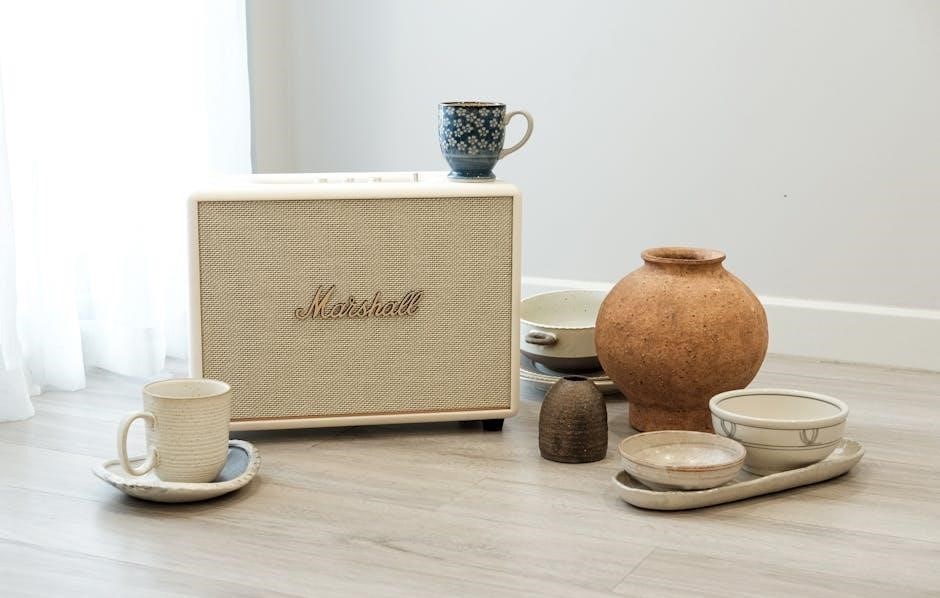The Sound Relationship House, developed by Dr. John Gottman, is a foundational theory in relationship science. It provides a blueprint for building and strengthening relationships through four essential levels: Friendship, Conflict Management, Shared Meaning, and Trust. This model emphasizes the importance of mutual support, emotional connection, and effective communication to create a resilient and fulfilling partnership.
Overview of the Gottman Method
The Gottman Method is a research-based approach to understanding and improving relationships, developed by Dr. John Gottman and his team. It focuses on identifying patterns and dynamics that predict relationship success or failure. By analyzing thousands of couples, Gottman identified key behaviors and strategies that foster intimacy, trust, and conflict resolution. The method emphasizes the importance of emotional connection, mutual respect, and effective communication. It provides practical tools and exercises, such as building “Love Maps” and “Turning Toward” your partner, to strengthen relationships. The Gottman Method is widely used in couples therapy and coaching, offering a structured approach to addressing challenges and building a resilient, fulfilling partnership. Its evidence-based techniques have made it a cornerstone of modern relationship science, helping couples worldwide achieve lasting harmony and connection.
The Concept of the Sound Relationship House
The Sound Relationship House is a theoretical framework developed by Dr. John Gottman to describe the essential components of a healthy and enduring relationship. It serves as a metaphorical blueprint, outlining the foundational elements necessary for building and maintaining a strong, resilient partnership. The model is rooted in extensive research on relationship dynamics and identifies key areas that predict long-term success. By focusing on shared purpose, emotional connection, and effective communication, the Sound Relationship House provides a comprehensive understanding of how relationships thrive. This concept is central to the Gottman Method, offering insights and practical strategies for couples and therapists alike to foster deeper intimacy and resolve conflicts effectively. Its structured approach emphasizes the importance of mutual support and understanding in navigating life’s challenges together. This framework has become a cornerstone in relationship science and therapy, guiding countless individuals toward stronger, more fulfilling connections.

The Four Levels of the Sound Relationship House
The Sound Relationship House consists of four levels: Friendship, Conflict Management, Shared Meaning, and Trust. Each level builds on the previous one, ensuring a strong foundation for lasting relationships.
Level 1: Friendship
Friendship is the foundation of the Sound Relationship House, emphasizing emotional connection and intimacy. It involves understanding your partner’s inner world through “Love Maps,” which are mental maps of each other’s thoughts, feelings, and desires. This level fosters a deep sense of closeness by knowing your partner’s life dreams, worries, and stresses. Friendship is built on mutual respect, trust, and shared joy, creating a strong bond that supports the relationship through challenges. By nurturing friendship, couples establish a resilient base for the other levels of the Sound Relationship House, ensuring a lasting and fulfilling partnership.
Level 2: Conflict Management
Conflict Management is the second level of the Sound Relationship House, focusing on how couples handle disagreements and challenges. This level emphasizes the importance of dialogue, understanding, and acceptance in resolving conflicts. It involves learning to approach disagreements with empathy, rather than hostility, and understanding each other’s perspectives. Effective conflict management strengthens the relationship by fostering mutual respect and reducing resentment. Couples learn to identify and address issues constructively, ensuring conflicts become opportunities for growth rather than destruction. This level builds on the foundation of friendship and paves the way for deeper connection and shared meaning in the relationship.

Level 3: Shared Meaning
Shared Meaning is the third level of the Sound Relationship House, focusing on creating a deeper emotional connection by sharing goals, values, and aspirations. This level emphasizes the importance of understanding each other’s life dreams and supporting one another in achieving them. It involves fostering a sense of purpose and unity, which strengthens the bond between partners. Shared meaning is built by engaging in meaningful rituals, exploring each other’s beliefs, and aligning on common goals. This level helps couples move beyond individual interests and create a shared vision for their relationship, enhancing intimacy and commitment. By fostering shared meaning, couples can navigate life’s challenges with a united front, ensuring their relationship remains fulfilling and resilient over time.
Level 4: Trust
Trust is the highest and most critical level of the Sound Relationship House, serving as the foundation that holds the entire structure together. It represents the unwavering belief in your partner’s reliability, emotional availability, and commitment to the relationship. Trust is built through consistent actions that demonstrate dependability, transparency, and support. When trust is present, partners feel secure in being vulnerable with each other, knowing they will be met with understanding and care. This level is essential for fostering resilience, as it allows couples to navigate challenges with confidence and unity. Without trust, the other levels of the relationship house cannot function effectively. Cultivating trust involves being attuned to each other’s needs, following through on commitments, and creating a safe environment for open communication and connection.

Key Components of the Sound Relationship House Theory
The Sound Relationship House Theory emphasizes Love Maps, Turning Toward, Managing Conflict, Shared Meaning, Trust, and Friendship as essential components for fostering deep, lasting connections.
Love Maps: Understanding Your Partner’s World
Love Maps are a fundamental concept in the Sound Relationship House Theory, representing the mental maps couples create to understand each other’s inner worlds. These maps include details about a partner’s hopes, fears, and desires. By regularly updating these maps through open communication, couples foster intimacy and connection. The process involves active listening and curiosity, ensuring that both partners feel understood and valued. Love Maps are the foundation of a strong relationship, as they help navigate life’s challenges together. This concept is explored in-depth in resources like “The Sound Relationship House PDF,” offering practical exercises to strengthen emotional bonds. Building accurate Love Maps is essential for creating a resilient and meaningful partnership.
Turning Toward: Building Emotional Connection
Turning Toward is a vital component of the Sound Relationship House, focusing on fostering emotional connection by actively engaging with your partner. It involves responding positively to bids for attention and affection, creating a sense of safety and intimacy. This practice strengthens the bond between partners by encouraging mutual understanding and support. Regularly turning toward each other helps prevent feelings of isolation and disconnection, which can undermine a relationship. The concept emphasizes the importance of small, everyday interactions in nurturing a deeper connection. Resources like “The Sound Relationship House PDF” provide practical exercises to help couples master this skill, ensuring they build a resilient and emotionally fulfilling partnership. By consistently turning toward one another, couples can create a strong foundation for their relationship to thrive.
Managing Conflict: Dialogue and Acceptance
Managing Conflict through dialogue and acceptance is a cornerstone of the Sound Relationship House theory. It emphasizes understanding and respecting each partner’s perspective, even during disagreements. This approach encourages open communication, fostering empathy and mutual respect. By engaging in constructive dialogue, couples can address issues without escalating conflicts. Acceptance involves acknowledging and valuing differences, rather than trying to change or control one another. This practice helps partners move beyond gridlock and find common ground. The Sound Relationship House PDF provides practical tools, such as questionnaires and exercises, to assess and improve conflict management skills. By mastering dialogue and acceptance, couples can transform conflicts into opportunities for growth and deeper connection, ultimately strengthening their relationship’s resilience and harmony. This level ensures that challenges are navigated collaboratively, reinforcing the foundation of trust and understanding.

Practical Applications of the Sound Relationship House
The Sound Relationship House offers exercises, tools, and strategies to enhance relationships. Workshops, questionnaires, and daily practices help couples build love maps, manage conflict, and foster emotional connection effectively.
Exercises to Strengthen Relationships
The Sound Relationship House theory offers practical exercises to deepen emotional bonds and improve communication. Couples can engage in activities like “The Sound Relationship House Inspection,” which involves checking off statements related to love maps, turning toward, and life dreams. Daily practices such as sharing admiration, building love maps, and discussing problems foster connection and intimacy. Exercises like “Small Things Often” encourage consistent, meaningful interactions. Additionally, assessment tools and questionnaires help identify strengths and areas for growth, allowing couples to target specific aspects of their relationship. These exercises, rooted in Gottman’s research, provide actionable steps to cultivate trust, manage conflict, and build shared meaning, ultimately strengthening the foundation of the relationship house.
Assessment Tools and Questionnaires
The Sound Relationship House theory incorporates specific assessment tools and questionnaires to evaluate the strengths and areas for improvement in a relationship. These tools, often provided in PDF formats, include checklists and scales that help couples identify their compatibility and emotional connection. For instance, the “Love Maps” questionnaire asks partners to assess their knowledge of each other’s thoughts, feelings, and experiences. Other questionnaires focus on conflict management, shared meaning, and trust. By completing these assessments, couples gain insights into their relationship dynamics and can pinpoint areas needing attention. These tools are widely used in Gottman Couples Therapy to facilitate open dialogue and guide structured interventions. The results serve as a roadmap for building a stronger, more resilient relationship, aligning with the Sound Relationship House framework.
The Sound Relationship House theory provides a comprehensive framework for fostering resilient relationships. By emphasizing friendship, trust, and shared meaning, couples can build lasting connections and navigate challenges effectively.
The Importance of Shared Purpose and Mutual Support
Shared purpose and mutual support are vital components of a thriving relationship, as emphasized in the Sound Relationship House theory. Couples who cultivate a shared sense of meaning and work together toward common goals foster deeper emotional intimacy and resilience; Mutual support involves actively encouraging and uplifting each other, creating a safe environment where both partners feel valued and understood. This foundation of trust and collaboration allows couples to navigate life’s challenges with unity and confidence. By prioritizing shared purpose, partners build a connection that extends beyond individual interests, creating a bond that strengthens over time. This aspect of the Sound Relationship House underscores the importance of teamwork and alignment in achieving long-term relationship satisfaction and fulfillment.
